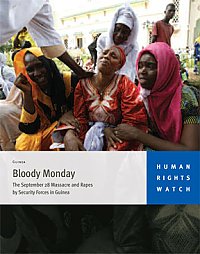Aristide Returns (The Nation)
By Dan Coughlin, the Nation
Former President Jean-Bertrand Aristide’s triumphant return to Haiti after seven years of forced exile in South Africa signals a new stage in the Caribbean country’s popular and democratic struggle just as a resurgent right wing prepares to lay electoral claim—for the first time ever—to the country’s presidency in a controversial US-backed presidential poll on Sunday.
“Today may the Haitian people mark the end of exile and coup d’état, while peacefully we must move from social exclusion to social inclusion,” said Aristide, referring to the bloody 2004 US-backed coup, the second time he was driven from power after being elected with huge popular majorities.
Aristide’s return comes at a key turning point in the country’s history. Bolstered by a 14,000-strong UN military occupation known as MINUSTAH, and massive international aid following the January 2010 earthquake, Haiti’s tiny right-wing elite have become stronger, economically and politically, than at any time in the last twenty-five years.
This has been dramatically underscored by the return of former dictator Jean-Claude “Baby Doc” Duvalier from France earlier this year and an openly fraudulent electoral process that has barred Haiti’s most popular political party —Aristide’s Fanmi Lavalas—from participation and put forth two right-wing candidates.
Michel “Sweet Micky” Martelly, 50, a popular konpa musician, faces off against Mirlande Manigat, 70, the wife, and some say surrogate, of a former right-wing president. Both candidates backed the 1991 and the 2004 coups against Aristide and support the return of the Haitian army, which Aristide disbanded in 1995.
“The international community is imposing their will, using the guns of the UN troops, to impose two very right-wing candidates with Duvalierist elements on the Haitian people,” noted Pierre Labossière of the San Francisco-based Haiti Action Committee.
Aristide’s return, which threatens the resurgent neo-Duvalierist movement and represents a victory for the popular movement, changes the political equation, according to many grassroots activists.
The extent of Aristide’s influence is clear from recently released Wikileaks cables.
A June 2005 State Department cable describes the US and Brazilian governments agreeing “that all efforts must be made to keep Aristide from returning to Haiti or influencing the political process.” In another just released 2005 cable, US and French diplomats threatened to block South Africa’s seating on the UN Security Council unless South African President Thabo Mbeki managed to keep Aristide in exile there.
The French said Aristide’s return would be “catastrophic” and even plotted to hinder Aristide in the logistics of reaching Haiti by air from South Africa.
“There has been a political vacuum at all levels since the absence of Aristide and especially since January 12 [2010 earthquake],” said Yves Pierre Louis, the Port-au-Prince bureau chief of Haiti Liberté, a left-wing weekly newspaper. “Aristide’s presence alone will be like a serum. It will revitalize the popular movement and the struggle against occupation and neo-liberalism.”
“Aristide can’t physically lead the fight against the MINUSTAH. But at least we’ll have somebody who can talk for us,” said 38-year-old Basil Gilène, standing in front of eight heavily armed Brazilian soldiers in Bel Air, one of the popular neighborhoods of Port-au-Prince. “The money they spend for the mess they call elections would have been better spent for housing for the people living in tents on the Champ Mars [in downtown Port-au-Prince] or to rebuild homes in [the hard-hit neighborhood of] Fort National. But instead we see it spent on worthless elections.”
While many grassroots activists welcome Aristide’s return, others caution that electoral politics and a focus on individual leadership has serious limits.
Outside her teeming neighborhood health clinic in Carrefour Feuille, amid earthquake rubble, young teenagers putting on “Welcome Home” Aristide T-shirts, and market women selling US AID food aid, community health activist Rosy Auguste notes the difficulties and mistakes that the popular and democratic movement has made over the last twenty-five years.
Leaders of popular organizations have been forced to move abroad, grassroots groups failed to educate younger generations on the horrors of Duvalierism and the dominant role of international actors in Haitian society continues unabated, says Auguste.
“It is for sure that the big countries have had a big weight in the country and that didn’t begin on January 12 with the huge increase in volume of NGOs in the country,” observes Auguste. “What will change this reality of Haiti, and the international role, is the mobilizations in the neighborhoods and the popular organizations to construct a stronger and more accountable Haitian state.”
One outcome seems certain, though: Aristide’s return will inject new energy into many parts of the popular and democratic movements, whose partisans had begun to despair that their inspirational symbol would never return.
“We in the popular masses, since [the] January 12 [earthquake], we have never found anybody who can get us out of the tents we are under,” said 29-year-old Guillaume Joseph, standing on a street corner with an unexcavated quake-collapsed building next to him. “When you see the misery the people are living in, the problem we have is we need a leader and that leader is Aristide. The elections are nonsense, whether it’s Martelly or Manigat, they are both putschists.”




Posted on March 24, 2011
0